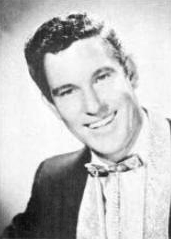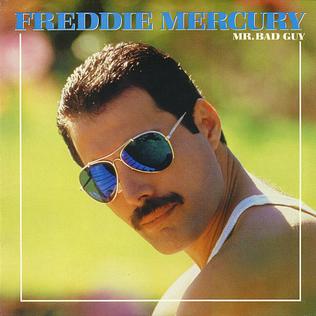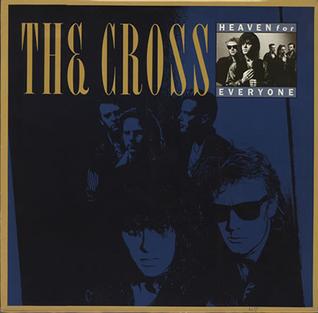Related Research Articles

"Crazy Little Thing Called Love" is a song by the British rock band Queen. Written by Freddie Mercury in 1979, the track is included on their 1980 album The Game, and also appears on the band's compilation album, Greatest Hits in 1981. The song peaked at number two in the UK Singles Chart in 1979, and became the group's first number-one single on the Billboard Hot 100 in the US in 1980, remaining there for four consecutive weeks. It topped the Australian ARIA Charts for seven weeks.

Frederick Segrest, known professionally as Freddie Hart, was an American country musician and songwriter best known for his chart-topping country song and lone pop hit "Easy Loving," which won the Country Music Association Song of the Year award in 1971 and 1972.

Mr. Bad Guy is the only solo studio album by British musician Freddie Mercury, lead singer of Queen. Released in 1985, during a period in which Queen were on hiatus from recording, it contains eleven songs, all written by Mercury himself.

"These Are the Days of Our Lives" is a song by the British rock band Queen. Although credited to the whole band, it was largely written by their drummer Roger Taylor, and is the eighth track on the band's 1991 album Innuendo.

"Tears in Heaven" is a song by Eric Clapton and Will Jennings, written about the death of Clapton's four-year-old son, Conor. It appeared on the 1991 Rush film soundtrack. In January 1992, Clapton performed the song in front of an audience at Bray Studios, Berkshire, England for MTV Unplugged, with the recording appearing on his Unplugged album.

"Too Much Love Will Kill You" is a song written by British guitarist Brian May of Queen, Frank Musker, and Elizabeth Lamers. The song reflected the breakdown of May's first marriage and attraction to his future wife, Anita Dobson. It was first recorded by Queen around 1988 or before, and was intended to be on the band's The Miracle album in 1989, but did not make the cut due to legal disputes following the band's decision that all songs on the album would be written by the group as opposed to individuals.

"Heaven for Everyone" is a song written by Queen drummer Roger Taylor. It originally appeared in his side project The Cross's album Shove It, with Freddie Mercury as a guest vocalist, and it is the album's fourth track. It was reworked with Queen's music and appeared in the 1995 album Made in Heaven where it was the seventh track, and was released as the first single – four years after Mercury's death. Queen's version reached number two on the UK Singles Chart while peaking at number one in Hungary and becoming a top-ten hit in several other European nations.

"Easy Loving" is a song composed by country music singer-songwriter Freddie Hart. Released in the summer of 1971, it became Hart's breakthrough hit and a country music standard.

"Only Love Can Break a Heart" is the title of a popular song from 1962, performed by the American singer-songwriter Gene Pitney. The song was written by Hal David (words) and Burt Bacharach (music) and appears on Pitney's second album Only Love Can Break a Heart.

"Heaven" is the debut single of American rock band Los Lonely Boys. The song was written by brothers Henry, Jojo and Ringo Garza, who comprise the foundation of the band, and it appears on their multi-platinum self-titled album.
"Loose Talk" is a 1954 song written by Hardy Turner, who wrote it using his wife`s name, Annie Lucas. Hardy Turner and Freddie Hart, both under aged, served in WWII together. Freddie Hart and recorded by Carl Smith and was his last number one. It was at the top spot of the Billboard country and western chart for seven weeks and had a total of 32 weeks listed there. The B-side was More Than Anything Else in the World: it peaked at number five in the same chart.
"Here Comes Honey Again" is a 1971 single by Sonny James written by James and Carole Smith. "Here Comes Honey Again" was the last of sixteen, number one country hits in a row for Sonny James. His next release, his remake of "Only Love Can Break a Heart", would peak at number two on country charts. "Here Comes Honey Again" would stay at number one for a single week and spend a total of fourteen weeks on the country chart.
"Super Kind of Woman" is a 1973 single by Freddie Hart and the Heartbeats. "Super Kind of Woman" was Freddie Hart's fifth number one on the country charts. The single stayed at number one for a single week and spent twelve weeks on the country chart.
"Got the All Overs For You ' is a 1972 single by Freddie Hart and the Heartbeats. "Got the All Overs For You " was Freddie Hart's fourth number one on the country chart. The single stayed at number one for three weeks at and spent a total of sixteen weeks on the country chart.
"My Hang-Up Is You" is a 1972 single by Freddie Hart and the Heartbeats. "My Hang-Up Is You" was Hart's second number one on the U.S. country singles chart. The single stayed at number one for six weeks and spent a total of eighteen weeks on the chart.
"You Are the Song " is a single by American country music artist Freddie Hart. Released in January 1976, it was the third single from his album The First Time. The song peaked at number 11 on the Billboard Hot Country Singles chart. It also reached number 1 on the RPM Country Tracks chart in Canada.
"The First Time" is a single by American country music artist Freddie Hart. Released in June 1975, it was the first single from his album The First Time. The song peaked at number 2 on the Billboard Hot Country Singles chart. It also reached number 1 on the RPM Country Tracks chart in Canada.
References
- ↑ Whitburn, Joel (2004). The Billboard Book Of Top 40 Country Hits: 1944-2006, Second edition. Record Research. p. 154.
| | This 1970s country song–related article is a stub. You can help Wikipedia by expanding it. |